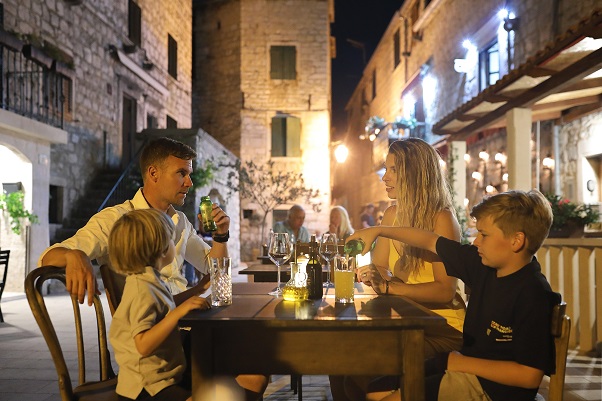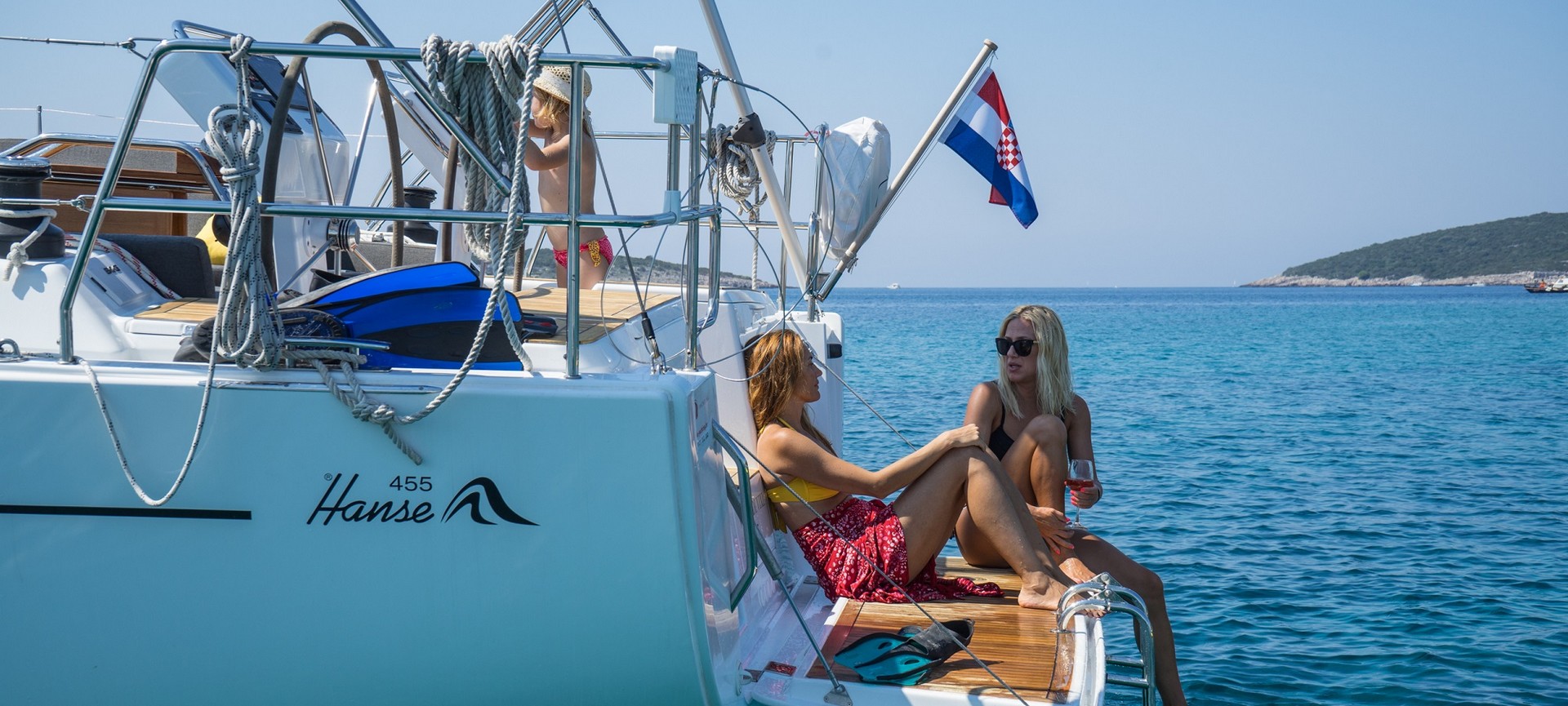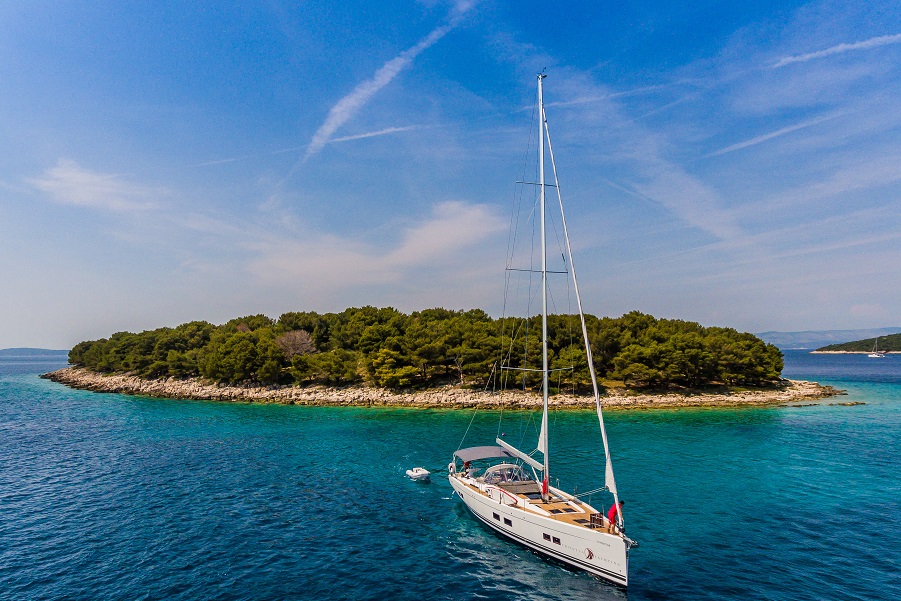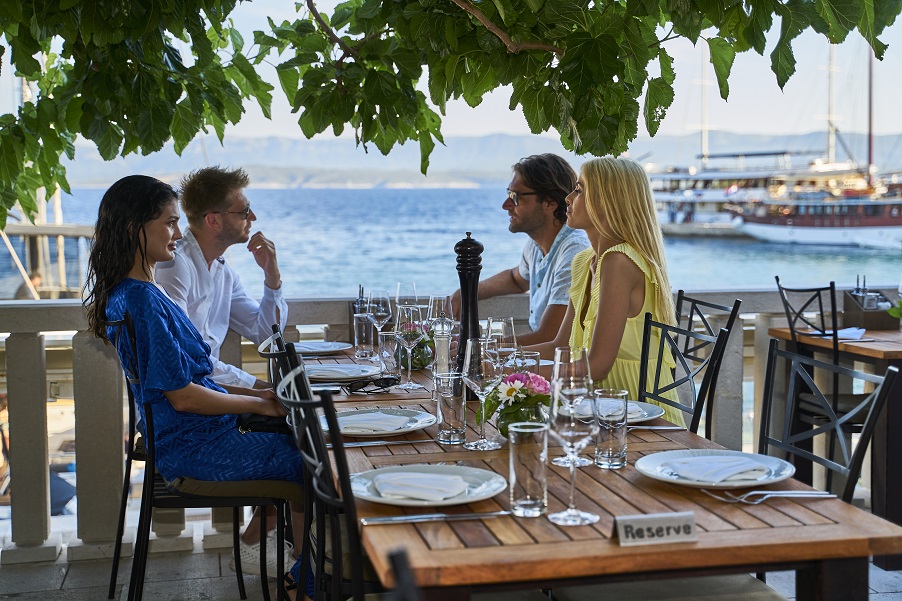Learn Basic Croatian Phrases and Connect with Locals

Table of Contents
- What language is Croatian?
- Croatian pronunciation
- Croatian alphabet
- What are the the three Croatian dialects?
- Must-learn Croatian phrases used in basic communication
- Basic Croatian phrases for introducing yourself
- Basic Croatian phrases you should know when you are in a restaurant
- Basic Croatian phrases used at the airport
- Basic Croatian phrases used when walking around the town
- The most iconic Croatian/Dalmatina terms
- Croatian sailing phrases
Given that Croatia is a small country that is sometimes difficult to spot on a world map, you would never think how diverse and interesting the Croatian vocabulary is. Within the borders of this beautiful Mediterranean country, there are several different dialects and thousands of interesting phrases.
In this article, we will guide you through the Croatian language dictionary, emphasizing the basic phrases that will certainly be useful to you when visiting this charming Mediterranean country.
What language is Croatian?
The Croatian language belongs to the South Slavic languages. Together with them, it belongs to the wider community of Slavic languages, and all of them together belong to the Indo-European language family.
Considering the turbulent past and thousands of years of rule by numerous different empires and kingdoms, the Croatian language abounds in words and phrases taken from numerous European nations. All of this is geographically conditioned, so in northern Croatia, you will more often hear words of Germanic origin, and in Dalmatia, Italian words. When all this is combined, a wide range of phrases and words is obtained, which Croats are very proud of and do not want to "put their language in a mould."
Croatian pronunciation
Pronunciation in Croatia is not too difficult! Words in Croatia are spoken exactly as they are written. This may not be the best advice for individuals who are struggling to read Croatian, but it serves as a reminder that there are no silent letters in words; all letters and syllables are pronounced.

Croatian alphabet
The Latin or "Roman" alphabet is used in Croatia. Although there are some differences, that is the same one we use in English. To begin with, there are 30 letters as opposed to the 26 in English. While some consonants differ, all vowels are same. In other words, there are some other ones that you might not be aware of. The names of them are:,, D,, LJ, NJ,, and. However, letters like Q, W, X, and Y are absent.
What are the the three Croatian dialects?
Croatian nowadays incorporates three regiolects, Kajkavian, Chakavian, and Shtokavian, and an expansive number of nearby tongues. Regiolects owe their names to their possessive forms of Croatian for "what". These are što, kaj and ča (Shtokavian, Kajkavian and Chakavian, separately).
The Croatian language is nuanced, and each županija (municipality), city, island, and village has its own linguistic characteristics. It may be shocking for outsiders, but Croatians in some cases don’t get each other’s lingo, indeed on the off chance that they live many kilometers apart.
The Štokavian dialect is and is present throughout Croatia. The Čakavian dialect is typical for Istria and Dalmatian islands, and the Kajkavian for Northern Croatia.
Must-learn Croatian phrases used in basic communication
Every foreign language learning process starts with some basic phrases that are indispensable in every conversation. In this way, we will start this „alternative foreign language school“ and first introduce you to must-learn phrases.
„Yes“ and „No“ In Croatian
As in English, in Croatian these words are very short, so Croats say „Da“ for yes and „Ne“ for no.
How to say „Hello“ in Croatian?
When meeting someone, what you should say is "Zdravo". There are also some other synonyms that you can use, such as „Pozdrav“ or „Bok“.
„Good morning“ in Croatian
Croats, ecpecially Dalmatians, cultivate a culture of not talking for a while when they get up in the morning. However, if you want to wish someone a good morning, you should say "Dobro jutro".
How to say „Thank you“ in Croatian?
Since thank you is a „magic word,“ it is one of the essential things to learn when traveling to another country. Croats have a very interesting, short, and a little bit challenging word for it – „Hvala“.
„Goodbye“ in Croatian
When you are leaving and saying goodbye to someone, it is correct to say „Doviđenja“ in Croatian. In a literal sense, this phrase means until the next meeting.
„How are you?“ in Croatian
This phrase is a good start to any conversation, and for that reason, it is good to learn that it is translated into Croatian as „Kako ste?“
„Please“ in Croatian
People's wisdom says: a beautiful word opens the iron door. Please is exactly such a word, and it is translated into Croatian as „Molim“.
Basic Croatian phrases for introducing yourself
When traveling, we often meet new people and are in a situation where we introduce ourselves and talk about ourselves. For many, this is the most fun part of traveling to another country, because it can be very interesting when different languages come together, as well as the same language and different pronunciations. Even when it all happens on beautiful Adriatic coast during the sunset with a glass of wine, fun is guaranteed. In the following, we bring you basic phrases on how to introduce yourself on your trip to Croatia:
- My name is… - Zovem se…
- What is your name? – Kako se ti zoveš?
- Nice to meet you. – Drago mi je.
- I am xy years old. – Imam xy godina.
- Where are you from? – Odakle ste?
- I am from… - Ja sam iz...

Basic Croatian phrases you should know when you are in a restaurant
Visiting local restaurants, or in this case, perhaps a Dalmatian konoba, is certainly one of the best parts of the trip. When you're already in a place that serves local food and drink, you'll definitely want to identify as much as possible with the area you're in and use local phrases.
Before we start with more complex phrases, you should know that beef is "govedina", pork is "svinjetina", and fish is "riba". Also, gluten-free is translated as "bez glutena"
To begin with, it wouldn't be a bad idea to start with "Can we order?" which would be "Možemo li naručiti?" in Croatian. Also, it is good to know that "Can I have a menu?" translates into Croatian as "Mogu li dobiti jelovnik?"
When toasting, Croats use the phrase "Živjeli" which expresses the wish for a long life. Also, when the food comes to the table, the correct phrase to wish for a good meal is "Dobar tek". When the waiter comes to your table and asks how the food is, if you are satisfied it is correct to say "Ukusno.".
When the dinner is finished, the question "Can I get the bill?" follows, which translates as "Mogu li dobiti račun?" in Croatian. Also, it is useful to know to ask if the tip is included in the price, which is said in Croatian as "Je li napojnica uključena u cijenu?".
Athough the English term dessert translates to „desert“ in Croatian, in Dalmatia they like to say "slatko" which menas sweet. So, if you are in a Mediterranean restaurant, it will be very nice if you ask "Što imate od slatkog?"
Also, don't miss the opportunity to taste „bevanda.“ This is a mixture of either white or red wine and water. Bevanda is best enjoyed in the late afternoon hours, once the heat or thirst dies down, or at lunchtime. If you don't like wine, you can try some of the Croatian beers.
Basic Croatian phrases used at the airport
The time spent at the airport during the trip can sometimes be a bit stressful but also boring, so initiating communication in the local language is a great way to fix it. However, we advise you to be a bit careful so that you don't end up on the other side of the world.
The first thing you will surely be interested in is where the check-in counter is, so you can dare to ask "Gdje je šalter za prijavu?" in Croatian.
When you arrive at the registration desk, you will certainly have many questions, and we give you tips on which of them to ask in Croatian. To begin with, to find out when your flight leaves, ask "Kada kreće moj let?". However, if for some reason you want to change your flight, ask "Mogu li promijeniti svoj let?"
Basic Croatian phrases used when walking around the town
If you decide to communicate in Croatian while walking and exploring the city, you should first know the basics. For example, Croats say "desno" for the right and "lijevo" for the left. Likewise, it is good to know that in Croatian the bus station is called "autobusna stanica", and the airport is "zračna luka".
Considering that you are in an unknown city, you will be interested in where things are. So, for Croats "Where is..?" is "Gdje je..?". Although the phrases listed so far seemed a bit challenging and not at all similar to English phrases, in Croatia there are also expressions that are the opposite of that. So, the Croats translated the cathedral as "katedrala", and the museum as "muzej".
Considering that you are traveling to a country with amazing beaches, it would be great if you could learn that Croatians call them "plaža".
The most iconic Croatian/Dalmatina terms
„Pomalo“
The description of the word “pomalo” cannot be found in any Croatian dictionary, as it is a proper Dalmatian dialect.Literally, “pomalo” means to take it easy, to relax, no stress, but also slowly, slow down, no worries.
„Ae“
You will hear this short exclamation or rather a sigh often and its application is universal. Expresses agreement, surprise, acceptance, confirmation, question, and questioning. In short, if you want to, you can express a lot with “ae” and save on words.
„Ajme“
Another brief exclamation with a variety of interpretations. It can convey shock, dismay, joy, sympathy, grief, or agreement with somebody who is outlining their situation. One thing is for sure, for whatever purpose you use this term, you will not go wrong.
„Fjaka“
Fjaka, Croatian state of min, can best be described as the „sweetness of doing nothing“ or being in a „day-dreamy state.
„Marenda“
It is a snack, in the morning or the afternoon, but in reality, it is a sacred ritual. Especially at work, “going to marenda” is an indispensable part of the day, an opportunity to relax. It usually has no limited duration, it can turn into a real bacchanalia, often including a glass of good wine. This Croatian expression is great to know if you visit a traditional Dalmatian restaurant.
Two important Phrases related to weather
For Croats, the weather changes are a very important aspect of the quality of life. So, in this section we have also included expressions „Jugo“ and „Bura“. For them these two winds are much more than a change in weather, and they have a significant impact on their mental health, productivity and mood. The definition of bura is a strong, dry northern or northeast wind that plummets from the top of Mount Velebit to the Adriatic sea. The Jugo is a warm and wet wind of even speed and constant direction that blows from the east-southeast to the south-southwest.

Croatian sailing phrases
Let's start with the basics:
- Sail – „Jedro“
- Deck –„Paluba“
- Mast – „Jarbol“
- Rudder – „Kormilo“
When setting sail, it is necessary to untie the ropes that tie the ship to the land, and Croats use the term "Odriši cime" for this. "Cime" is the name for the ropes, which should be emphasized, and "odrisi" is a local expression, i.e., Dalmatian. However, Croats adore this expression and use it in connection with all life situations. For them, "Odriši cime" has a deep meaning and signifies going out into the world, courage, and determination in life.
Furthermore, the term "set sail" is translated as "Razapni jidro". Also, the term is very popular, so much so that there is even a song with that name.
When you sail, it would be good to know the phrase „Bonaca“. Bonaca is a common word used in Croatia for calm and peaceful sea.
We hope that through this article we have brought the Croatian language and phrases closer to you. Although you will often hear that this language is a bit difficult to learn, it doesn't have to be that way at all. Also, if you ever make a mistake, it won't be a problem. On the contrary, it will sound very nice, and you will secure the sympathy of the locals.
To which language group does Croatian belong?
The Croatian language belongs to the South Slavic languages.
What languages is Croatian similar to?
Croatian language is very similar to the languages of neighbouring countries such as Serbia, Montenegro, and Bosnia and Herzegovina, so through Croatian you will also learn some other languages of Southeast Europe.
Is Croatian pronunciation difficult?
Not at all. Words in Croatia are spoken exactly as they are written and there are no silent letters in words; all letters and syllables are pronounced.
What phrase does the Croatian use most often when they greet each other?
Croatians most often use the phrase „Zdravo“ to greet. They also use expressions like „Pozdrav“ or „Bok“.
What does the phrase „pomalo“ mean in Croatian?
This phase signifies the easy Dalmatian lifestyle, without worries and a hurry.
How can I compliment someone in Croatian?
To offer a compliment in Croatian, you might say "Lijepo izgledaš" (You look nice).
What are key emergency phrases in Croatian?
If you are in danger or need help for any reason, you should shout "Upomoć!" (Help!) in Croatia.
What's the Croatian phrase for asking if someone speaks English?
To inquire if someone speaks English in Croatia, you can ask "Govorite li engleski?" .















